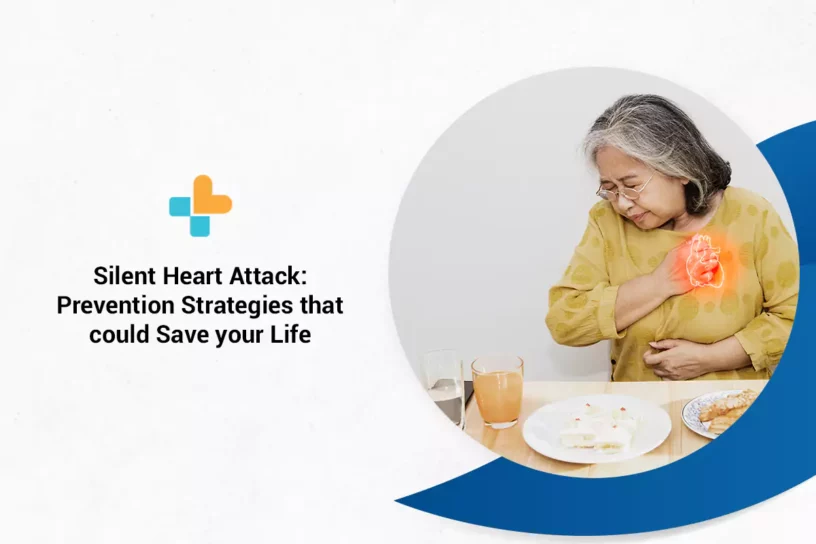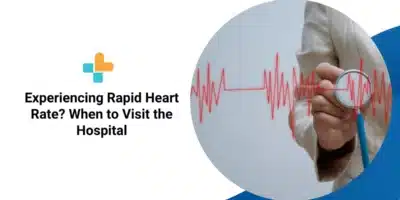Did you know that you could be going through a silent heart attack right now without you even realizing it? It can show minimal symptoms or none at all, making it difficult to detect without proper medical intervention.
A silent heart attack — also known as a silent myocardial infarction, or SMI — accounts for 45% of all heart attacks and is more common in men than in women.
In this blog post, we’ll explore the risk factors of a silent heart attack and prevention strategies that will safeguard your heart health.
What Is a Silent Heart Attack?
Silent heart attacks are a type of heart attack that occur with minimal or no symptoms.
Contrary to the typical heart attack that causes chest pain, shortness of breath, and other noticeable symptoms, a silent heart attack can be difficult to diagnose as it shows no symptoms.
Silent heart attacks occur when your heart isn’t getting oxygen due to a lack of blood flow to a part of the heart muscle, just like in a typical heart attack.
Due to the symptoms being either minimal or nonexistent, there might be a delay in diagnosis and treatment, making it even more dangerous than a typical heart attack.
Risk Factors of Silent Heart Attack
A silent heart attack shares the same risk factors as a regular heart attack, which include the following:
- Age: The risk of having a silent heart attack increases with age. This is especially true for men over the age of 45 and women over the age 55.
- Gender: According to research, men were roughly twice as likely as women to get a heart attack over the course of their lifetime. Men are also more prone than women to get a silent heart attack as a result of this.
- Family history: Individuals with a family history of heart disease, heart attacks, or stroke are at higher risk of having a silent heart attack, especially if they have a first-degree male relative who had a heart attack by age 55 or a first-degree female relative by age 65.
- High blood pressure: High blood pressure can harm blood arteries, which makes it more difficult for the heart to pump blood effectively and raises the possibility of a silent heart attack.
- High cholesterol: Excessive cholesterol can result in the formation of plaque in the arteries, which narrows them and raises the risk of heart attacks, including silent ones.
- Smoking: Smoking damages blood vessels, speeds up the clogging and narrowing of coronary arteries, and increases the risk of a silent heart attack. Additionally, smokers are twice as likely to have and die from a heart attack or stroke.
- Diabetes: Having diabetes can increase the risk of heart disease by damaging blood vessels and nerves. Diabetes further increases the risk of a silent heart attack due to high blood sugar levels.
- Obesity: Those who are overweight or obese are more likely to get heart disease and stroke than persons who are at a healthy weight. Diabetes, high cholesterol, and high blood pressure are all risk factors for a silent heart attack and can all be brought on by obesity.
Symptoms of a Silent Heart Attack
A silent heart attack can have symptoms different from those of a typical heart attack or even show no symptoms at all.
Some common symptoms of a silent heart attack may include:
- Fatigue or weakness
- Shortness of breath
- Indigestion or heartburn
- Dizziness or lightheadedness
- Unexplained sweating
- Discomfort or pain in the jaw, neck, or upper back
- Mild discomfort in the chest that may feel like pressure, squeezing, or fullness
A typical heart attack may share some of the previously mentioned symptoms along with other ones:
- Chest pain or discomfort that may feel like pressure, squeezing, fullness, or pain
- Shortness of breath (with or without chest discomfort)
- Discomfort or pain in the arms, neck, jaw, shoulder, or back
- Lightheadedness, dizziness, or fainting
- Nausea or vomiting
- Cold sweats
Note: Not everyone suffers from all of these symptoms, and some people may have none at all. You should consult a doctor right away if you notice any symptoms that worry you.
Prevention Strategies for a Silent Heart Attack
Adopting positive lifestyle changes can enhance overall heart health, helping to prevent silent heart attacks. These are a few important lifestyle modifications.
1. Healthy Diet
A balanced, healthy diet can help reduce the chance of developing heart disease and stop a silent heart attack.
Fruits, vegetables, whole grains, lean proteins, and heart-healthy fats like those in nuts, seeds, and fatty fish are typical components of a diet that promotes heart health.
Taking healthy dietary measures can also aid in maintaining a healthy weight, which is crucial for overall heart health.
Foods high in salt, sugar, and trans fats, as well as added sweeteners, should be consumed in moderation since they can raise the risk of a silent heart attack and contribute to the development of heart disease.
2. Regular Exercise
Daily exercise can also reduce the chance of developing heart disease and stop a silent heart attack. You should do at least 150 minutes of moderate-intensity exercise or 75 minutes of vigorous-intensity exercise to maintain good heart health. Strength and stretching workouts are also essential.
Exercise is important for maintaining a healthy weight, which is essential for general heart health, as well as managing and preventing high blood pressure, high cholesterol, and diabetes.
3. Weight Management
Maintaining a healthy weight is crucial for heart health. Being overweight or obese can increase the risk of heart disease and a silent heart attack. Losing weight through a combination of healthy eating and regular exercise can lower this risk.
To help with weight management, try adopting healthy habits such as limiting portion sizes, avoiding sugary and processed meals, and getting enough sleep.
4. Stress Reduction
Chronic and long-term stress can have detrimental effects on the body, including an increase in blood pressure, which can accelerate the onset of heart disease.
Practicing stress-reducing techniques like meditation, yoga, or deep breathing can help lower stress levels and improve heart health.
You can engage in hobbies or activities that bring relaxation to effectively manage stress and improve overall heart health. This includes reading, listening to music, spending time in nature, practicing a creative art like painting or writing.
5. Quitting Smoking
Smoking destroys blood vessels and lowers blood oxygen levels, which raises the risk of heart disease and a silent heart attack. As a result, quitting smoking is crucial for heart health. You can increase blood flow and lower your risk of heart disease by giving up smoking.
Also, quitting smoking may enhance general health and lower the risk of developing other illnesses like cancer and respiratory illnesses.
6. Limiting Alcohol Consumption
Drinking too much alcohol can also increase the risk of silent heart attack. Experts recommend limiting alcohol intake to no more than one drink per day for women and two drinks per day for men.
Excessive alcohol consumption can also lead to high blood pressure, weight gain, and an increased risk of heart failure.
Also Read : 10 Simple Ways to Keep Your Heart Healthy
Preventing Silent Heart Attack with Ayu Health: Strategies for a Healthy Heart
It is important to be proactive about heart health and take steps to prevent a silent heart attack. Make sure to implement these preventive strategies in your daily routine to lower the risk of heart disease and improve overall heart health.
At Ayu Health, we prioritize the prevention and management of heart disease. Our team of doctors works together to provide comprehensive care and personalized treatment plans to promote heart health.
Contact us today to schedule a consultation and take control of your heart’s health.
Our Hospital Locations
Cardiology Surgery Hospitals in Chandigarh | Cardiology Surgery Hospitals in Bangalore | Cardiology Surgery Hospitals in Jaipur | Cardiology Surgery Hospitals in NCR | Cardiology Surgery Hospitals in Hyderabad
Our Doctors
Cardiology Surgery Doctors in Chandigarh | Cardiology Surgery Doctors in Bangalore | Cardiology Surgery Doctors in Jaipur | Cardiology Surgery Doctors in NCR | Cardiology Surgery Doctors in Hyderabad
About the Author

Dr. Magesh Balakrishnan
Dr. Magesh Balakrishnan is a renowned cardiologist currently practicing at Ayu Health, Bangalore.
He has 16 years of experience in this field. He has excellent skills in performing all cardiac diagnostic procedures/ tests. He has performed emergency and elective angiographies and angioplasties, device implantation (Pacemaker, AICD & CRT)




